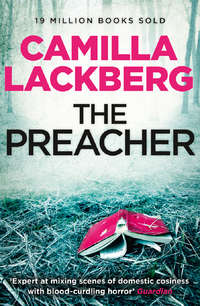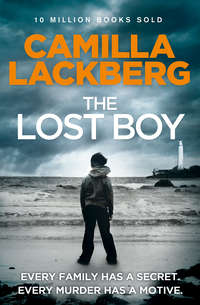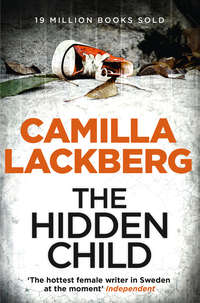
Полная версия
The Girl in the Woods
Dagmar seemed to know what he was thinking and gave him a big smile.
‘Even I have a hard time believing that’s me. But the strange thing is, I feel the same way inside as I did back then. Sometimes I’m shocked when I look at myself in the mirror, and I find myself saying: “Who’s this old lady?”’
‘How long were you involved in sports?’ asked Paula.
‘Not long, compared to athletes today, but too long for those days. When I met my husband, I had to put sports aside, and then I had a child and a house to take care of. But I’m not blaming my daughter. That’s the way things were. She’s a fine person. She wants me to come and live with her when I can’t take care of the house any more. She’s getting on in years herself. She’ll be sixty-three this winter, so I think we’d get along all right if we ended up under the same roof.’
Martin took a sip of coffee from the delicate cup.
‘It’s Kopi Luwak coffee,’ said Dagmar when she saw the look of pleasure on his face. ‘My eldest grandchild imports it to Sweden. It’s made from coffee beans eaten by civet cats. The civets poop out the beans, which are then gathered, washed, and roasted. It’s not cheap. Usually costs about six hundred kronor per cup, but as I said, Julius imports the coffee, so he gets it for a better price, and sometimes he gives me some. He knows I love it. You’ll never taste better coffee.’
Martin looked at the coffee aghast, but then shrugged and took another sip. He didn’t care where it came from when it tasted so divine. He hesitated for a moment but decided it was time to move on from the small talk.
‘I don’t know whether you’ve heard the news,’ he said, leaning forward. ‘But a little girl was found murdered up here in the woods.’
‘I heard. My daughter came by and told me,’ said Dagmar, her expression darkening. ‘That sweet little blonde girl who was always running around like a tornado. I still go out for a long walk every day, and I often go past the Berg farm. I’d often see her out in the yard.’
‘When did you last see her?’ asked Martin, taking another sip of coffee.
‘Hmm … when was it?’ said Dagmar, looking pensive. ‘Not yesterday, but the day before, I think. On Sunday.’
‘What time of day?’ asked Paula.
‘I always take my walk in the morning before it gets too hot. She was out in the yard, playing. I waved to her as I walked past, like I always do, and she waved back.’
‘So that was Sunday morning?’ said Martin. ‘But not since then?’
Dagmar shook her head.
‘No. I didn’t see her yesterday.’
‘Did you happen to see anything that struck you as unusual? The smallest detail could be important. So even if something seems trivial to you, better to tell us and we’ll decide whether it’s significant or not.’
Martin drank the rest of his coffee. He felt so clumsy holding the fragile little cup in his hand. He set it carefully down on the saucer.
‘No, I can’t say I recall anything that would be of interest. I have a good view out the kitchen window when I’m sitting here, but I don’t remember seeing anything special.’
‘If you happen to think of something later on, don’t hesitate to phone us,’ said Paula, getting up after casting an enquiring glance at Martin, who nodded.
She put her business card on the table and pushed in her chair.
‘Thanks for the coffee,’ said Martin. ‘It was excellent and also … an experience.’
‘Precisely the way things in life should be,’ replied Dagmar with a smile.
He glanced again at the photo of the beautiful young athlete and saw the same glint in her eye as in the eyes of ninety-one-year-old Dagmar. He recognized that glint. Pia had had it too: joie de vivre.
With great care he closed the lovely old front door behind him.
Mellberg stretched as he sat at the head of the conference table. An impressive group of reporters had gathered. Not only from the local papers, but from the national media as well.
‘Is it the same perpetrator?’ asked Kjell from Bohusläningen.
Patrik was keeping a close eye on Mellberg. He would have preferred to take over, but Mellberg had put his foot down. A press conference was his moment in the spotlight, and he wasn’t about to give up the opportunity. This was in stark contrast to his readiness to step aside when it came to anything that resembled hard work.
‘We can’t rule out the possibility of a link to the Stella case, but we’re not going to get locked into any one theory,’ said Mellberg.
‘But surely it’s not a coincidence,’ Kjell insisted.
His dark beard now had a few streaks of grey.
‘As I said, we will of course investigate every angle, but when something seems too obvious, there’s a risk we might not look into other possibilities.’
Good answer, Mellberg, thought Patrik with surprise. Maybe he’d actually learned a few things along the way.
‘Though clearly it does seem a strange coincidence that the film star should come back here right before this happens,’ said Mellberg. All the reporters began feverishly taking notes.
Patrik had to clench his fists to stop himself from slapping his forehead. He could already guess what the evening headlines would be.
‘So, are you planning to question Marie and Helen?’ asked a hack from one of the evening papers.
The younger reporters were always the most persistent. Hungry to establish themselves at the paper and prepared to do whatever it took to make their name.
‘Yes, we plan to talk to them,’ Mellberg confirmed. It was obvious he was enjoying all the attention.
He gladly turned his face towards the cameras aimed at him, reaching up to make sure his comb-over was in place.
‘So are they your prime suspects?’ asked a young female reporter from the other big evening paper.
‘Well, I mean … No, I wouldn’t exactly say that …’
Mellberg scratched his head and seemed to realize he might have turned the conversation in the wrong direction. He looked at Patrik, who cleared his throat and said:
‘We have no suspects at this stage of the investigation. As Bertil Mellberg said, we’re not ruling anything out yet. We’re waiting for the technical report, and we’re carrying out interviews on a broad front, talking to people who might provide information regarding the time period when Nea disappeared.’
‘So you think it’s merely coincidence that a girl from the same farm disappears and is found dead in the same place as Stella, during the same week when one of the individuals convicted in the Stella case comes back here for the first time in thirty years?’
‘The most obvious connections are not always the most significant,’ he replied to the follow-up question. ‘So it would not be wise for us to get locked into one theory right now. As Mellberg has already pointed out.’
Kjell from Bohusläningen raised his hand to indicate he had another question.
‘How did the girl die?’
Mellberg leaned forward.
‘As Patrik Hedström mentioned, we haven’t yet received the technical report, and the post-mortem hasn’t been done. So at this time we can’t address that question.’
‘Is there a risk other children might be murdered?’ Kjell went on. ‘Should parents in the area keep their children inside? As you might expect, rumours have been spreading, and people are scared.’
Mellberg paused before answering. Patrik discreetly shook his head, hoping his boss would get the message. There was no reason to frighten the local population.
‘At the present time there is no reason for concern,’ Mellberg said. ‘We’re putting all our resources into this investigation. We will find out who killed Linnea Berg.’
‘Was she killed in the same way as Stella?’
Kjell wasn’t giving up. The other journalists looked from him to Mellberg. Patrik crossed his fingers that Mellberg would stand firm.
‘As I said, we won’t know until we have the results of the pathology report.’
‘But you’re not denying it?’ the young hack chimed in.
In his mind Patrik again pictured the body of the little girl, lying exposed and alone on the cold autopsy table. He couldn’t help snapping, ‘We’ve already told you that we won’t know anything until we get the pathology report!’
The young reporter retreated, looking offended.
Kjell raised his hand again. This time he looked straight at Patrik.
‘I’ve heard your wife is writing a book about the Stella case. Is that true?’
Patrik had known the question would come, but he still felt unprepared for it. He looked down at his clenched fists.
‘For some reason, my wife refuses to discuss her projects, even with the excellent resources she has at home,’ he said, drawing a ripple of laughter from the reporters. ‘So I’ve only heard a few things about it in passing. I don’t know how far along she is in her research. I’m usually kept out of the creative process, and I don’t get involved until she asks me to read the completed manuscript.’
That wasn’t entirely true, but almost. He knew roughly what stage Erica had reached in the project, but only because of a few casual remarks she’d let slip. She was always reluctant to talk about her books while she was working on them, and he usually got involved only if she needed to ask him about any police-related issues. But she rarely supplied any context when putting her questions, so they were little help in getting a sense of the book itself.
‘Could that have been a contributing factor? For another murder?’
The young woman from the evening paper was looking at him expectantly, and he could see the gleam in her eye. What the hell did she mean? Was she saying his wife might have provoked the death of the little girl?
He was about to open his mouth to deliver a scathing reply when he heard Mellberg’s calm admonition:
‘I consider that question both tasteless and irrelevant. And no, there is nothing to suggest any connection whatsoever between Erica Falck’s book and the murder of Linnea Berg. And if you can’t refrain from such outrageous questions during the next’ – Mellberg glanced at his watch – ‘ten minutes that remain of this press conference, I won’t hesitate to cut it short. Understood?’
Patrik exchanged astonished glances with Annika. And to his great surprise, the journalists behaved themselves for the rest of the press conference.
After Annika had ushered everyone out, overriding their mild protests and attempts to ask a few more questions, Patrik and Mellberg remained behind in the conference room.
‘Thank you,’ said Patrik simply.
‘I’ll be damned if I’ll let them go after Erica,’ muttered Mellberg, and turned away.
He called to Ernst, who had been lying under the table where Annika had set out coffee for the reporters, and then left the room.
Patrik laughed quietly to himself. Amazing. The old guy had a streak of loyalty in him after all!
BOHUSLÄN 1671
Elin had to admit that Britta looked enchanting. Her dark eyes were beautifully offset by the blue fabric of her gown, and her hair had been brushed to a glossy sheen. She wore her hair loose, held back from her face by a lovely silk ribbon. It was not often that they received such a grand visitor. Actually never, if truth be told. Such dignitaries had no reason to visit a simple vicarage in Tanumshede parish, but the king’s edict issued to Harald Stake, governor of Bohuslän, had been quite clear. All the representatives of the church in the county were to be involved in the battle against sorcery and the forces of evil. The government and the church had joined together to fight the devil, and for that reason the vicarage in Tanumshede was to be honoured with a visit. The message was to be spread to all corners of the realm; that was what the king had decreed. And Britta was quick to understand and exploit the opportunity. They would offer the very best in food, lodging, and conversation during Lars Hierne’s visit. He had politely suggested he might stay at the local inn, but Preben had told him that would be out of the question. At the vicarage they would be delighted to receive such an esteemed guest. Even though the inn had a separate section for noble and refined guests, the Tanumshede vicarage would see to it that the governor’s envoy would be offered all the comforts he might desire.
Britta and Preben were waiting at the door when the carriage arrived. Elin and the other servants kept to the background, their heads bowed and their eyes fixed on their feet. Everyone had been ordered to appear neat and tidy, dressed in clean clothing. And the girls had all combed their hair so carefully that not a strand escaped from beneath their kerchiefs. The air was filled with the fresh scent of soap and the pine boughs the servant boy had used to decorate the rooms that morning.
When the vicar and his wife were seated at the table with their guest, Elin poured wine into the big tankards her father had always used to serve wine when she was growing up. They had been passed on to Britta as a wedding gift. When she married, Elin had received several of the tablecloths her mother had embroidered. Her father had not wanted the finer things from his home to end up in the poor hovel of a fisherman. And Elin had actually agreed with his decision. What would she and Per have done with such frills and finery? Those things were better suited to the vicarage than Elin’s simple home. But she treasured her mother’s tablecloths. She kept them in a small chest along with the herbs she gathered and dried every summer. She always wrapped the herbs in paper so as not to stain the white cloths.
Ever since she was little, Märta had been sternly warned never to open the chest. Elin did not want her child’s sticky fingers touching her mother’s tablecloths, but the admonition was also because some of the herbs could be poisonous if not handled properly. Her maternal grandmother had taught her the uses of the various herbs, along with the words of supplication to be used. There could be no confusion, or disaster might ensue. Elin was ten years old when her grandmother began teaching her, and she had decided to wait until Märta was the same age before she passed on her knowledge.
‘Oh, how terrible it is with all these wives of the devil,’ said Britta, giving Lars Hierne a gentle smile.
Enchanted, he stared at her lovely features glowing in the light of the many tallow candles. Britta had chosen well when she decided to wear the blue brocade dress; the fabric gleamed and sparkled against the backdrop of the dark walls in the vicarage dining room, making Britta’s eyes look as blue as the sea on a sunny day in July.
Elin silently wondered how Preben was reacting to the way their visitor was immodestly staring at his wife, but he appeared completely unaffected. He seemed to pay no attention at all. Instead, Elin felt him looking at her, and she quickly lowered her gaze. She had already noticed that he too looked exceptionally stylish. When he was not wearing his clerical garb, he dressed most often in dirty work clothes. For a man of his position, he had an odd fondness for doing manual labour on the farm and taking care of the livestock. On her very first day at the vicarage, Elin had asked one of the other maids about this and was told it was indeed strange, but the master often worked side by side with his servants. They had simply grown accustomed to this unusual behaviour. Yet the maid had gone on to say that the mistress did not favour her husband’s conduct, which had led to many quarrels at the farm. When the maid suddenly realized who Elin was, her whole face turned red. This sort of response occurred frequently. Elin held a strange position on the farm, since she was both a maid and the sister of the vicar’s wife. She belonged and yet did not belong. When she entered the servants’ quarters the others would often stop talking and refuse to look in her direction. In that sense, she felt even lonelier, but it did not greatly concern her. She had never been friends with many women, most of whom she regarded as spending far too much time gossiping and squabbling.
‘Yes, these are troubling times,’ said Lars Hierne. ‘Yet we are fortunate to have a king who refuses to turn a blind eye, a king who dares to enter the battle against the evil forces we are now fighting. This has been a difficult year for the realm, and the ravages of Satan have been greater than for many generations. The more of these women we can find and bring to trial, the faster we can quell the devil’s power.’
He took a bite of bread and ate it with pleasure. Britta’s gaze was fixed on his lips, and her face shone with both fascination and alarm.
Elin listened closely as she carefully refilled his tankard with wine. The first course had been served, and Boel of Holta need not feel shame for the meal she had prepared. They were all eating with great appetite, and Lars Hierne praised the food many times, which caused Britta to modestly throw out her hands.
‘But how can you be certain these women are part of the devil’s web?’ asked Preben as he leaned back in his chair, holding the tankard in his hand. ‘We have not yet found the need to bring anyone to trial here in our district, but I doubt we will be spared. Though so far we have merely heard rumours and loose talk about how others have set about the task.’
Lars Hierne tore his eyes away from Britta and turned to Preben.
‘It is actually a very simple and straightforward process to establish whether someone is a witch – or a sorcerer, for that matter. We must not forget that women are not the only ones who may succumb to Satan’s temptations. Although it is more common for womenfolk, since they are more susceptible to the devil’s enticements.’
He gave Britta a solemn look.
‘To determine whether the accused is indeed a witch, we first subject her to the water test. She is bound, hand and foot, and thrown into deep water.’
‘What happens next?’
Britta leaned forward. She seemed to find the subject fascinating.
‘If she floats, she is a witch. I am proud to say that so far we have not subjected a single innocent woman to an unjust accusation. They have all floated like birds. And with that, they have revealed their true nature. Afterwards they are offered the chance to confess and receive God’s forgiveness.’
‘And have they confessed? The witches you have seized?’
Britta leaned even closer, and the flames from the candles cast dancing shadows over her face.
Lars Hierne nodded.
‘Oh yes, they have all confessed. Some have required … persuasion in order to elicit a confession. Where a woman has been long under Satan’s power or deeply in thrall to the evil one, his hold may be greater. But in the end they all confess. And upon confessing they have been executed according to the decree of both king and God.’
‘You are carrying out a most important task,’ said Preben, nodding pensively. ‘Yet I dread the day when we must carry out such a painful duty here in our parish.’
‘Yes, it is indeed a heavy cross to bear, but we must have the courage to take on whatever obligations Our Lord asks of us.’
‘In truth, in truth,’ said Preben, raising the tankard to his lips.
The next course was now brought to the table, and Elin hurried to pour more red wine. All three had already had a good deal to drink, and a slight haze had appeared in their eyes. Again Elin felt Preben looking at her, and she took great pains not to meet his eye. A shiver raced down her spine, and she nearly dropped the pitcher she was holding. Her grandmother used to call such a feeling a premonition of trouble brewing. But Elin convinced herself it was merely a gust of wind from a gap in the window frame.
Later, when she went to bed, however, the feeling returned. She drew Märta closer on the narrow cot they shared, in an attempt to fend it off, but the feeling stayed with her.
Chapter Eleven

Gösta was glad he wasn’t expected to attend the press conference. It was nothing but show and spectacle, in his opinion. He always had the feeling the journalists were there to find fault and stir up trouble rather than to communicate with the public and contribute to the investigation. But maybe he was a cynic. When you’d been in the job as long as he had, cynicism became a habit that was hard to break.
Конец ознакомительного фрагмента.
Текст предоставлен ООО «ЛитРес».
Прочитайте эту книгу целиком, купив полную легальную версию на ЛитРес.
Безопасно оплатить книгу можно банковской картой Visa, MasterCard, Maestro, со счета мобильного телефона, с платежного терминала, в салоне МТС или Связной, через PayPal, WebMoney, Яндекс.Деньги, QIWI Кошелек, бонусными картами или другим удобным Вам способом.








